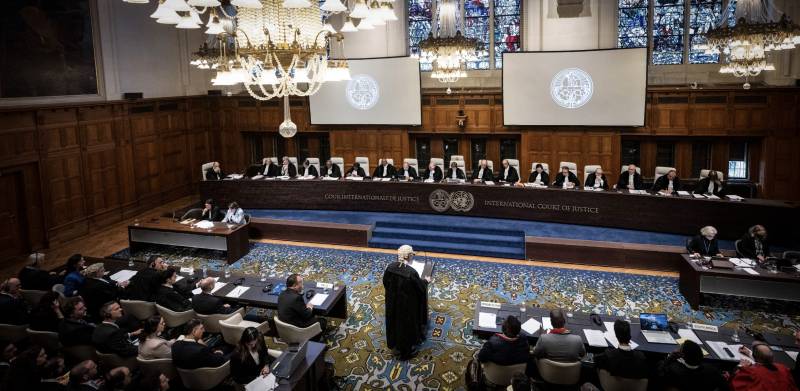
In the intricate domain of international relations, the International Court of Justice (ICJ) finds itself under intense scrutiny as it grapples with South Africa’s case, where it accuses Israel of breaching the obligations under the UN Convention on the Prevention and Punishment of the Crime of Genocide. However, the ICJ’s failure to deliver a concrete verdict in this case could bring the institution’s credibility to the lowest point. Thereby, the quest for the ICJ to redeem its credibility lies in the righteous ruling of this case.
South Africa's decision to bring Israel before the ICJ, accusing Israel of violating international law, is undeniably audacious, as the other signatories to the Genocide Convention of 1948, especially Muslim states, were negligent in doing so. The 84-page application forwarded to the ICJ said Israel's actions in Gaza were "genocidal in character because they're intended to bring about the destruction of a substantial part of the Palestinian national, racial, and ethnic group." The application concludes by urging the court to issue an interim order to protect Palestinians, requiring Israel to immediately suspend its military operations in Gaza. This move, while signaling South Africa's commitment to addressing what it perceives as a grave injustice, simultaneously puts the ICJ’s credibility to the test in resolving these types of cases.
While the experts view the application forwarded by South Africa as serious and well-researched, Israel has categorically denied the allegations, calling them “blood libel." It could ignore the measures, but to do so would cause enormous reputational harm and a loss of influence on the world stage for Israel and its principal backer, the US.
South Africa’s application, under the erga omnes obligation—the duty of an individual state towards the international community as a whole—laid down by the Genocide Convention, seems very timely and significant, as the destruction caused by Israel has already killed more than 23,000 Palestinians and wreaked havoc in the region, with almost 85% of Gaza’s population forced to leave their homes, while the majority of people in Gaza have been starved over a period of three months. Here, ICJ could find itself in a whirlpool, as any wrong decision might abysmally hurt the institution’s reputation.
While the Palestinians have highly appreciated the symbolism of South Africa, marking herself the first country to file a genocide case against Israel before the World Court, it is speculated that the ICJ would be unable to decide on Israel’s alleged genocide. The ongoing hearing focuses on whether the ICJ should issue an interim order for Israel to cease its actions in Gaza. Yet, enforcing such an order is challenging, relying on a UN Security Council resolution. The US, a staunch supporter of Israel, consistently vetoes critical resolutions, making enforcement unlikely. Similar to the ICJ's ruling on Russia's Ukraine invasion and the US itself rejecting the ICJ judgments on cases involving Nicaragua (1986) and Iran (2018).
Critics assert that the ICJ's credibility has been eroding, pointing to perceived ineffectiveness in handling previous high-profile cases. They argue that recent decades have witnessed the breakdown of the "rules-based international order." The Security Council failed to prevent genocide and war crimes in Bosnia, Iraq, Afghanistan, Syria, and against the Uyghurs in China. Paradoxically, the Security Council endorsed genocidal sanctions on Iraq, causing around half a million children's deaths—a price deemed acceptable by U.S. Secretary of State Madeleine Albright. International institutions also failed to hold accountable figures like Dick Cheney, Tony Blair, and George Bush, casting doubt on their credibility. They point out that the institutions often seem to serve Western dominance rather than dispensing justice. They also critique the ICJ for its perceived bias stemming from the composition of the court, with judges appointed by member states. This inherently introduces geopolitical considerations into the decision-making process, raising concerns about the court's objectivity. Critics argue that the ICJ must transcend these influences, emphasizing the imperative for the court to demonstrate an unwavering commitment to the principles of justice. South Africa’s case over Israel’s genocidal conduct becomes a litmus test for the ICJ's ability to rise above national interests and alliances.
It could not be predicted how much time it would take for the ICJ to announce its verdict in this case. Although, from its past practices, one could speculate that this case is also less likely to produce impartial and unbiased results. However, the ICJ's role in this process is pivotal, and its handling of the case will undoubtedly shape perceptions of the court's credibility for years to come.
In conclusion, the ICJ finds itself on trial, as it would have to navigate the complexities of South Africa's case against Israel over the conduct of genocide. The quest for redeeming credibility is not merely a matter of legal acumen, but a profound test of the institution's ability to transcend geopolitical influences and deliver impartial justice. The outcome of this case will resonate through the corridors of international diplomacy, leaving an indelible mark on the ICJ's standing in the global arena.

